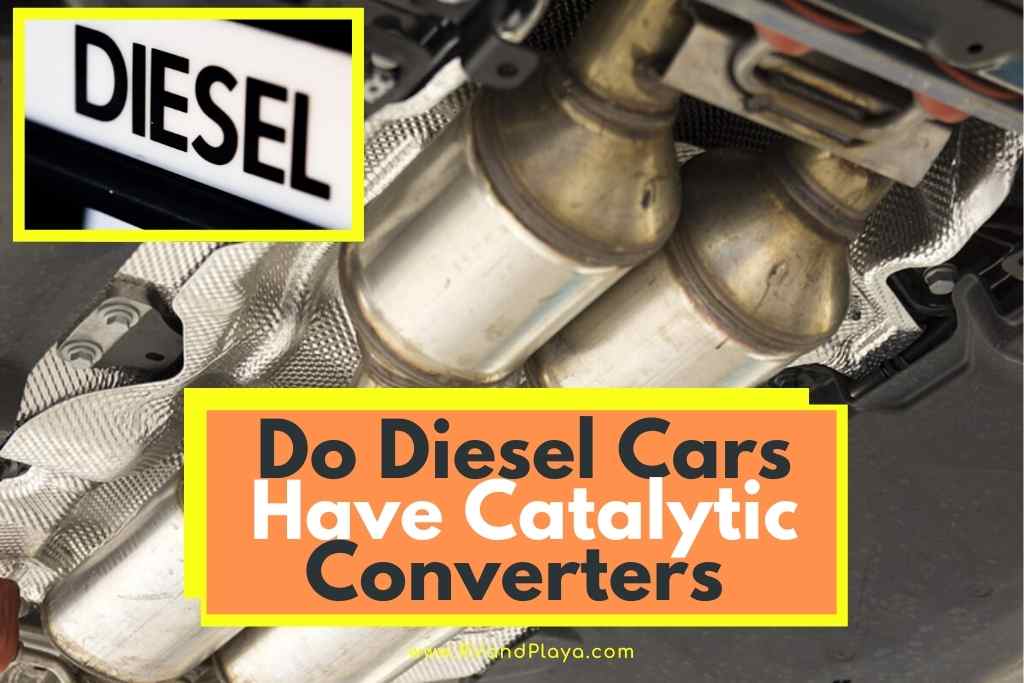Have you ever asked yourself or your friend if diesel cars have catalytic converters? Well, you are at the perfect place to find the answer to such a question.
With the rise of atmospheric pollutants in recent decades, car manufacturers are doing more and more to combat pollutants that are discharged by gasoline and diesel engines—although diesel engines are far less culpable.
So, do diesel cars have catalytic converters? Yes, diesel engines do have a catalytic converter but not in the same sense that standard, gasoline vehicles do. A diesel engine doesn’t put out the same level of pollutants that a gasoline engine does, therefore it’s treated a bit differently.
The diesel version of the catalytic converter cleans the harmful emissions through a four-part system, all contained in one piece of hardware that you could call a catalytic converter.
Diesel engines also produce other byproducts that aren’t found in gasoline vehicles.
The extreme amount of money that goes into the catalytic converter for a gasoline-powered engine is also not an issue for diesel engines.
Since diesel ignites through compression rather than a spark, it doesn’t need the robust and expensive metals in a standard cat converter.
Table of Contents
How the Diesel Catalytic Converter Works
The diesel catalytic converter is a four-part system with each part working to convert a particular pollutant.
- Diesel Oxidation Catalyst (DOC)
- Diesel Particulate Filter (DPF)
- Selective Catalytic Reduction (SCR)
- Exhaust Gas Recirculation (EGR)
Each one functions on its own but as a part of the whole of what we would call a catalytic converter and the process of converting potentially harmful gasses to harmless emissions happens here.
All four parts aren’t found in all diesel engines, however, sometimes only three is enough to take care of the potential pollutants.
Read also: How Much Does it Cost to Unclog a Catalytic Converter (Replacement Cost)
Do You Need A Catalytic Converter On A Diesel
So, do you need a catalytic converter on a diesel? Yes, you need a catalytic converter on a diesel. The catalytic converter enables to clean up NOx emissions by converting them into less harmful molecules. The process happens through a chemical reaction with oxygen.
The platinum content in these devices is what enables them to clean up NOx emissions by converting them into less harmful molecules through a chemical reaction with oxygen and the help of other chemicals, such as urea or DEF.
Do Old Diesel Cars Have Catalytic Converters
No, old diesel cars do not have catalytic converters installed. However, catalytic converters (CATs) have been fitted in the exhaust of the majority of diesel cars manufactured since 2001.
Do New or Modern Diesel Cars Have Catalytic Converters
Yes, all new or modern diesel cars have catalytic converters to help filter and convert up to 99% of combustion engine exhaust pollutants
Do Diesel Cars Have Catalytic Converters Stolen
Yes, diesel cars also have catalytic converters that have been stolen. The reason is simple since metal prices go up the demand for catalytic converter parts that contain them goes up too.
Read also: Which Cars Are Most Likely to Have a Catalytic Converter Stolen (Catalytic Converter Theft)
How much is a diesel catalytic converter worth?
The average price of a catalytic converter will vary from $50 for a small one to up to $400 for a large catalytic converter.
Below you can find some average prices for different catalytic converters which included:
- Small foreign catalytic converter: $108 – $141
- Medium foreign catalytic converter: $121- $203
- Large foreign catalytic converter: $202- $392
- XL foreign catalytic converter: $398- $454
- Foreign pre catalytic converter: $48- $71
- Exotic catalytic converter: $225 – $450
- High grade domestic catalytic converter: $145- $192
- Pre- domestic catalytic converter: $27- $62
- Torpedo catalytic converter: $80 – $250
- Small catalytic converter: $83 – $158
Diesel Oxidation Catalyst
The closest thing to what a catalytic converter does in a gas-powered vehicle, the diesel oxidation catalyst is responsible for converting carbon monoxide into carbon dioxide as well as dealing with any leftover fuel by effectively decomposing it.
While it’s the smallest of the four, it is usually the first part of the system that emissions pass through. Since “oxidation” is in its name, you can guess how exactly it converts carbon monoxide into carbon dioxide.
Any additional hydrocarbons, diesel particulates, and aldehydes are all oxidized into harmless levels of carbon dioxide before happily exiting your exhaust system.
Diesel Particulate Filter
The diesel particulate filter is part that filters the one thing that a diesel reproduces that a standard, gasoline engine does not, soot. The part of the filter that gets rid of the soot particulates is the “wall-flow monolith.”
It may sound like something straight of an Egyptian archeological dig, but in reality, it’s just a filter for soot.
The wall-flow monolith traps these particulates and holds them, not releasing them until they have been effectively broken down.
Though a diesel engine catalytic converter isn’t known for using rare materials, there is a bit of palladium and platinum within the DPF to boost the catalytic conversion process.
The particulates are superheated until they are reduced to something small enough to be filtered out.
Read also: How To Unclog a Catalytic Converter Without Removing It (Best Tips – 2 Methods)
Selective Catalytic Reduction
This single part of the four-part system is responsible for converting nitrogen. Normally, rhodium is responsible for the breakdown of nitrogen, however, there is too much oxygen in a diesel system for rhodium to be even remotely effective.
Diesel engines compensate by releasing ammonia, which is what breaks down the nitrogen and renders it into an inert and harmless gas.
The SCR—although you’ll find it as a single part in a four-part diagram of a diesel catalytic converter—is not always needed.
There are other ways to render reactive nitrogen back to its original, inert state. The Selective Catalytic Reduction and the Exhaust Gas Recirculation systems found in diesel engines are pretty much interchangeable.
Exhaust Gas Recirculation
Since nitrogen is essentially inert, it takes a lot of heat in order to make it reactive.
The sort of heat you get in a combustion chamber. What the EGR does, is allow exhaust fumes to recirculate into the system.
Except that it only lets in a very precise and measured amount. This keeps the gasses to a point where they are not too much and not too little. This keeps the temp down and therefore keeps nitrogen inert.
Since roughly 80% of what we breathe in is nitrogen, it’s as harmless as nominal levels of oxygen once it’s filtered back out of the system through the exhaust manifold.
Basically, all the EGR does is maintain nitrogen in its normal state.
Are Diesel Catalytic Converters As Expensive As Gas Catalytic Converters?
Typically, diesel catalytic converters are not as expensive as gasoline catalytic converters because the rare materials that go into a gasoline catalytic converter are not required in diesel-powered vehicles.
They’re known as PGMs or Platinum Group Metals. They are rhodium, platinum, and palladium. Palladium has recently become more valuable than gold.
Of course, that’s also the reason that thieves are more than happy to slide up underneath your vehicle and steal the converter.
Despite the value of palladium, it still doesn’t hold a candle to rhodium, which is valued at over $18,000 per ounce. Palladium is valued at around $3,000 per ounce and platinum is sitting pretty at $1,000 per ounce.
Diesel catalytic converters aren’t as sought after, however, as they lack the PGMs of their gasoline counterparts.
No matter how high up your diesel sits, thieves are unlikely to target it. That is unless they’re not very smart thieves.
Considering the fact that these metals are becoming so expensive, manufacturers are seeking new ways to accomplish the same goal of reducing harmful gasses while utilizing a different material composition.
Can A Diesel Engine Run Without A Catalytic Converter?
Like any gasoline engine vehicle, a diesel car can run just fine without a catalytic converter. However, you don’t want to be caught without one, especially if you live in California.
Of course, you would have to replace it with a section of the exhaust pipe.
Without replacing it, everyone and their mother would know that you’re driving without a cat converter or, at the very least, without a section of your exhaust system because everyone within five square miles will be able to hear you coming.
Several things will change if you remove the catalytic converter.
- The Check Engine Light will stay on
- Fuel economy will change
- The exhaust sound will change
In most cases, the fuel economy of the vehicle will suffer, at least very slightly. Without the sensors being able to detect fuel emissions, the ECM will likely change the amount of fuel being fed to the engine, altering your miles per gallon.
As aforementioned, the exhaust noise will increase dramatically.
Even if you replace the catalytic converter with a new section of pipe, it will still be loud, just not so loud that it ruptures eardrums when your vehicle blasts by at 10mph.
The check engine light will be another problem and if your ECM changes the fuel amounts as a result of the check engine light, it may increase the amount of fuel consumption and further reduce your overall fuel economy.
Simply replacing the catalytic converter with a straight pipe won’t do much to regain the lost fuel economy either.
You would literally have to go in and modify how the entire system works so that the sensors aren’t constantly going off and altering your fuel distribution.
Lastly, there are the fines you will have to deal with if caught.
While not every state conducts hands out fines equally, the repercussions for removing your catalytic converter are likely to cost you more than it would to just go get another one put in.
All Things Considered
While diesel and gasoline engines are worlds apart in how they initiate combustion, they’re still required to have a catalytic converter.
Although they aren’t the same, they’re still necessary.
Regardless of what you’re driving, there’s bound to be a catalytic converter, in some form or another, installed somewhere, doing what it does best by helping to keep the air clean.
Here are some of my favorite tools & equipment´s
Thank you for reading this article. I hope it helps you find the most recent and accurate technical and repair information for your car. Here are some tools that I use as an automotive technician and hope you´ll also find helpful.
There are affiliate links, so if you do decide to use any of them, I´ll earn a small commission. But in all honesty, these are the exact tools that I use and recommend to everyone, even my own family. (NO CRAP)
To see all my of most up-to-date recommendations, check out this resource that I made for you!
References
https://www.carparts.com/blog/can-you-drive-without-a-catalytic-converter/
https://completecar.ca/maintenance/do-diesel-engines-have-catalytic-converters/
Recent Posts
How to Start a Car with a Clogged Catalytic Converter (Explained)
Make no mistake about it, the internal combustion engine is a marvel of (relatively) modern engineering. Think of all the ways that the internal combustion engine has changed our lives for the...
How To Check If Your Catalytic Converter Is Bad (6 Common Problems)
Have you ever wondered how to check if your catalytic converter is bad? Look no more. We´ve got you covered. The Catalytic Converter is a vital component of a vehicle because it reduces bad...


